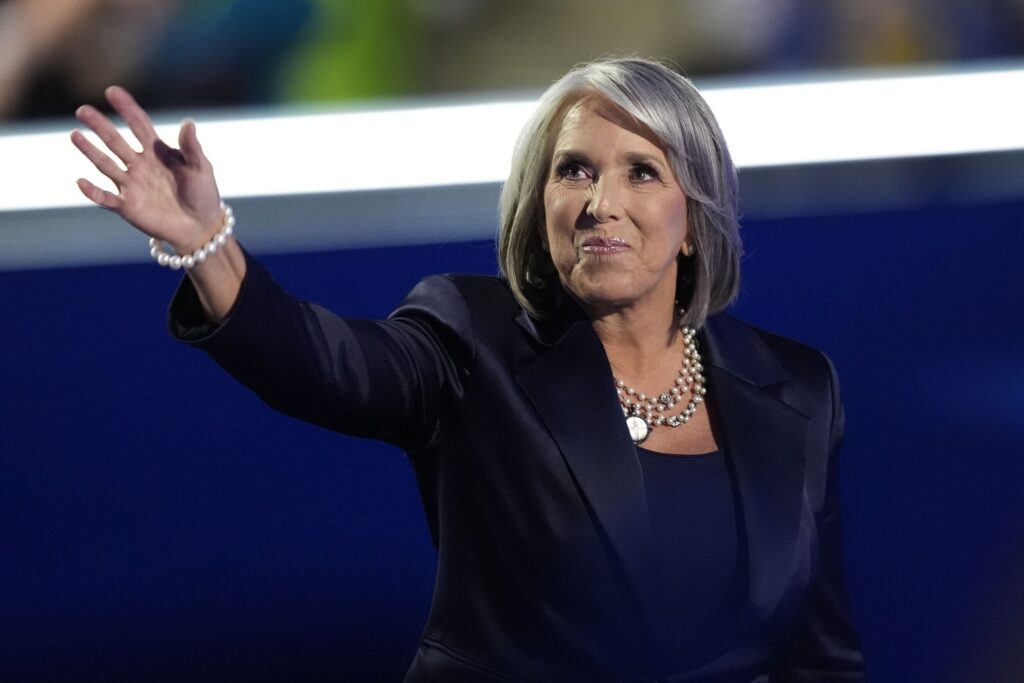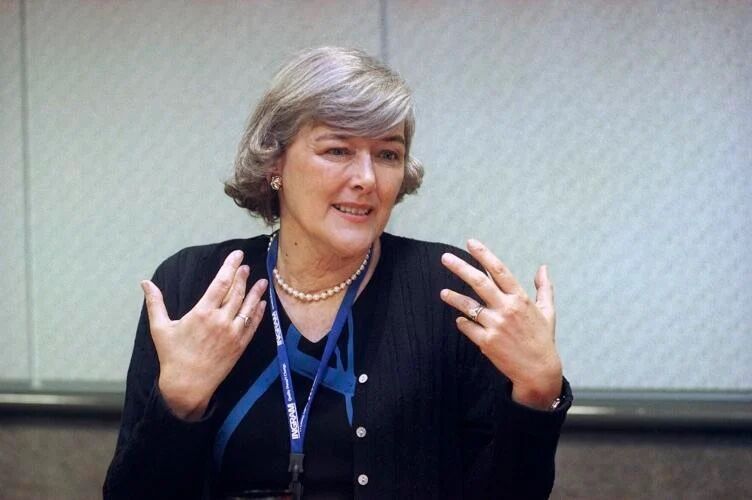Athanasopoulos stresses grassroots, counterinsurgency tactics in bid for state GOP chair
Former congressional candidate and Army veteran George Athanasopoulos is running an aggressive campaign for Colorado Republican Party chairman, unafraid to call out the party and his current opponent as he argues the GOP should pick him to turn the state red.
“I am the one person that will change the Republican Party in a way that will allow us not only to fight the Democrats but to beat the Democrats,” Athanasopoulos said during a recent interview with The Colorado Statesman. “I will go out and advocate for our principles, but more so I will fight against the Democrats while advocating for our principles.”
Shortly after losing his bid to unseat U.S. Rep. Ed Perlmutter by about 15 points in November, Athanasopoulos, an outspoken conservative, jumped in the race for the state Republican Party’s top spot, and he’s been swinging hard since. Party officers will be chosen in a vote of the GOP’s central committee sometime in March. (A party spokesman said last week that the meeting, typically held on a Saturday, would be scheduled soon.)
Athanasopoulos, 38, a recently retired Army major, likens the job ahead for Colorado Republicans to counterinsurgency tactics he honed while serving four tours in Iraq.
“It is a fight,” he said. “The Democrats see elections not as occasional popularity contests but as an ongoing war for political power that never ends. My experience was in the military in Iraq. One of the things that came out of Iraq was the rewrite of the counterinsurgency manual. Page 1, chapter 1 was that, counterinsurgencies – those are wars for political power, just like the type of things Saul Alinksy was calling for here in the United States.”
Taking a page from the noted leftist activist and his own experience battling insurgents, Athanasopoulos said Republicans have to take ground-level organizing seriously.
“Republicans, by and large, have come in at the last-minute and believed that can beat the Democrats. The Democrats come in and they build bottom-up. We have to not only get smarter, we have to build our victories from the bottom up,” he said. “You have to have a fundraising committee structure that empowers the county parties. You have to go into these local communities, start building relationships. You have to start penetration networks. You have to do all the small things to start building a long-term advantage. We have to do it now, and we have to sustain that effort at least through 2020 if we want to retake our state with redistricting after the 2020 Census.”
He said he believes legislative boundaries drawn after the 2010 Census have left Republicans at a severe disadvantage, and that winning the 2018 elections – for governor and legislative seats – is crucial.
“Those boundaries are ridiculous, to put it mildly,” Athanasopoulos said. “We have to undo the harm that was done to our party or we will suffer another decade of Democratic dominance.”
Athanasopoulos is one of two candidates so far seeking the Colorado GOP’s chairmanship, although the race could get more crowded as the vote appraoches. El Paso County Republican Party Chairman Jeff Hays jumped into the race earlier this month, while current state Republican Party Vice Chairman Derrick Wilburn has said he’s weighing a bid and plans to announce his intentions by the end of January. The incumbent chairman, Steve House, has also said he plans to say this week – after press time – whether he’ll seek a second term or possibly run for governor.
State party leadership will be chosen after Republicans complete reorganization meetings at the county level throughout February. The state central committee, which votes on a chair, vice chair and secretary, is made up of GOP elected officials – including members of Congress, legislators and district attorneys – and three officers from each county, along with so-called bonus members assigned to counties based on total votes for the top of the ticket in the most recent election – President Donald Trump, in this case.
Since Hays jumped in, both declared chair candidates have been crisscrossing the state and making their case before Republican and conservative groups and on social media. Athanasopoulos, for his part, has been pitching it as a contest between the grassroots and establishment, although Hays isn’t conceding that framing, instead arguing that he’s got the experience and vision to lead the party.
Athanasopoulos is drawing a sharp distinction with Hays on two matters – the state GOP’s controversial independent expenditure committee and voter-approved measures that change the way state parties nominate candidates.
Saying he supports an IEC, which allows virtually unlimited fundraising to support state-level candidates, Athanasopoulos calls it necessary to match the funding advantage Democrats could enjoy but adds that he wants to scrap its current incarnation and start over.
As for Propositions 107 and 108, which mandate a presidential primary and create a mechanism to allow unaffiliated voters to cast ballots in party primaries, Athanasopoulos says the state GOP must immediately file a lawsuit seeking to keep them from being implemented.
“The IEC is a great concept and can be a valuable tool moving forward,” he said. “However, the way it’s currently constructed, I do not support. What I want to see is a board that governs what the IEC does and how it does it that is evenly balanced between all parts of the Republican Party. The IEC can be a great uniter because, if every faction within the Republican Party has ownership of the IEC and is included in the process, it can do great things to heal the divisions we’ve seen in the Republican Party over these last 20, 30 years.”
He also said he wants to establish “ironclad prohibitions against spending money against one Republican in favor of another Republican,” potentially requiring an outside accounting firm to be involved in enforcing the rules.
Calling the current IEC “legally compromised” – pointing to years of expensive litigation challenging its existence – Athanasopoulos argued, “It’s better to shut it down, rebuild it from scratch, that way you can’t go back and relitigate it. You start fresh. You put in a balanced board, you put in the necessary rules and safeguards so it doesn’t play in primaries.” It’s all necessary, he added, in order to allow Republican candidates to “seriously compete with all the special interests that are aligned with the Democrats. We have to have a way to compete. The IEC is the great equalizer.”
Hays disagrees.
“There are already guardrails that prevent the IEC from meddling in primaries,” he told The Statesman. “Any claim to the contrary is misinformed. Certain reforms may be appropriate, but, as a general rule, we should spend less energy blowing-up our own institutions and more on blowing-up the Democrats.”
Athanasopoulos is vocal about his opposition to 107 and 108, a position shared by House and Hays before the election. He said he intends to seek an injunction to stop implementation of the ballot proposals, which passed in November.
“The Colorado Republican Party is a private organization,” he said. “The voters of Colorado telling the Republican Party how we manage our internal affairs doesn’t pass constitutional muster. My position is, if you want to play on our team, you have to wear our jersey. There’s a good football analogy.”
It’s crucial to maintain what Athanasopoulos termed the current “hybrid system” of nominating candidates to a primary ballot – via either the caucuses and assembly process or petitions – in order to keep voters happy while also allowing candidates without vast initial resources to have a chance.
“It allowed grassroots candidates – like myself when I ran for Congress – ballot access. It also allows other candidates to petition on. You have assemblies, you have caucuses, you have all the party-building mechanisms that are necessary. By the way,” he said, “Jeff Hays is an opponent of the caucus process and is an opponent of that grassroots-type mobilization. But then you also have a vote in the primary. That’s important, it helps bring in all parts of the party.”
Athanasopoulos has been distributing copies of an opinion article Hays authored a year ago in opposition to the caucus system – Hays links to the article himself on his campaign site – and argues that it points up a big difference between the candidates.
“If 107 and 108 are implemented, not challenged, you’ll have the situation where you’ll have the caucus take place after the presidential primary takes place. The fact that 107 clearly stipulated we couldn’t begin the caucus process until after the presidential vote – that is a significant blow to party-building,” Athanasopoulos said. “Who’s going to show up after they’ve already cast their ballot? It’s not a death knell to the grassroots, but it significantly hurts the party.”
“We need to proceed cautiously,” Hays, who opposed both 107 and 108 before the election, told The Statesman. “Democrats don’t like open primaries either, but they would like nothing more than for the Republicans to sue unilaterally to prevent implementation of 107 and 108 because if we succeeded, they would share in the benefits, and if we failed, Republicans alone would bear the consequences of having offended unaffiliated voters. A unilateral lawsuit would create a win-win for Democrats.”
As for how the party should react if a lawsuit seeking an injunction fails, Athanasopoulos called suggestions that the GOP consider opting out of holding a primary – an option available to every party under 108 – “the atomic bomb in the room, so to speak.”
“I’m not in favor of opting out as a first choice,” he said. “That should be a measure of last resort,” However, he added, “If Republicans, as I travel the state, are adamant they’ll want to convene a meeting of the state central committee, I’ll convene it. If they want to have that meeting and have that vote, I’ll do that.”
It would take a vote of three-fourths of a party’s central committee to “opt out of holding a primary election that is open to unaffiliated voters,” according to Initiative 108’s ballot language. “Instead, they may choose to nominate candidates in an assembly or convention that is limited to voters affiliated with that party.”
“I think our first move needs to be to file suit,” Athanasopoulos said. “That is our best path. If an injunction is denied, if the state is insistent on imposing statute on our internal party mechanisms, we’ll cross that bridge when we come to it.”
Athanasopoulos pulls no punches arguing against Hays’ positions.
“Jeff Hays – his candidacy represents an imminent threat to the grassroots,” Athanasopoulos said. “If he becomes chairman, not only has he been very outspoken about his opposition to caucuses, but he will not file suit against 107 and 108, so you will have open primaries, you will have unaffiliated voters voting in our primaries, and, if he continues to allow the IEC to exist in its current form, then you will have unlimited amounts of money involved being spent by a flawed structure. All of that adds up to a grassroots that is disenfranchised and marginalized with no ability to compete and no voice within the party and no means to be able to select candidates.”
However, like Hays – and nearly every other Republican Party chair candidate in memory – Athanasopoulos pledges to make sure the party stays completely neutral in the nominating process.
“I promise that the party under my leadership will be an honest broker,” he said. “There will be no taking positions on policy or personality. That’s everything from overt support to picking and choosing which candidates you call back and in what matter. The party is responsive in one way with one candidate and entirely different with another candidate. Who is the party to determine who is a serious candidate?”
“There’s all kinds of ways you can undermine a candidate as a state party, and that’s wrong,” he continued. “People are leaving the Republican Party because it doesn’t stand on principle and it’s a party that cannot be trusted. I plan on changing that. I want to bring back dissatisfied Republicans and show them our party is honest, it’s capable and we will stand on principle.”











